Key takeaways:
- Fair fees establish trust, transparency, and reflect the service’s quality, enhancing customer experiences and loyalty.
- Unfair fees can lead to frustration, erosion of trust, and financial strain, negatively impacting both consumers and service providers.
- Negotiating fair fees involves preparation, transparency about expectations, and leveraging competition to achieve more favorable outcomes.
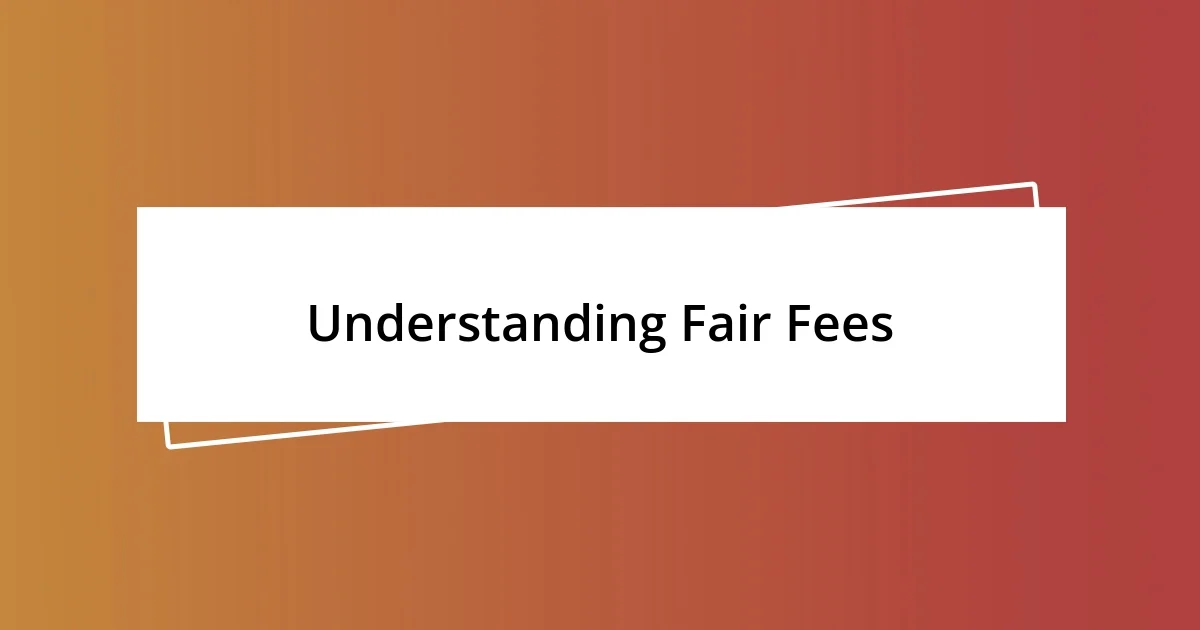
Understanding Fair Fees
Understanding fair fees is quite a nuanced topic, one that benefits from a personal touch. I’ve often found myself grappling with the concept when considering service fees, especially in areas like healthcare and education. Have you ever stopped to think about what “fair” truly means? It’s not just about the final number but also about the transparency and value behind it.
Take, for example, my experience at a local gym. Initially, I was taken aback by the joining fee, but after attending a few classes and seeing the quality of instruction offered, the investment started to make sense. It’s moments like these that provoke reflection: is the fee proportionate to the service provided? When we sense value, we tend to feel more at ease with the costs.
I’ve learned that fair fees should embody not only the cost of a service but also consideration for the consumer’s experience. Have you ever felt deceived by hidden costs? I know I have, and such experiences underline the importance of clarity in pricing. In a world where every dollar counts, understanding the rationale behind fees can foster trust and satisfaction, elevating the entire experience.
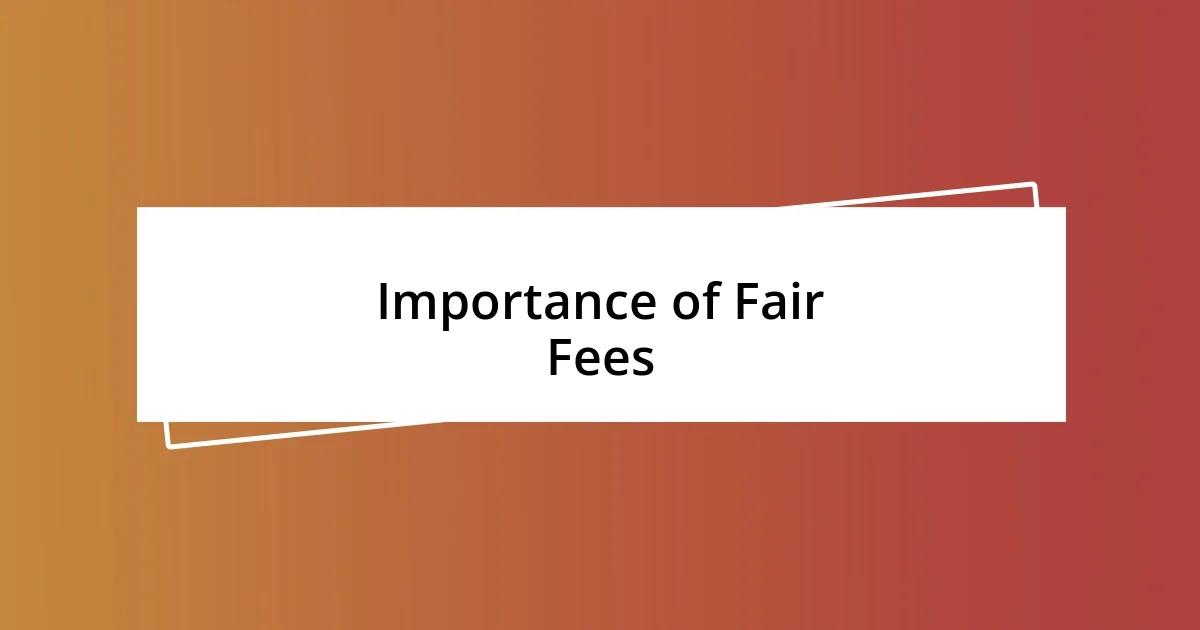
Importance of Fair Fees
Fair fees are crucial because they establish trust between the service provider and the consumer. I once had a frustrating experience with a home repair service that initially quoted a low price, only to hit me with extra charges at the end. This left me feeling taken advantage of and quite annoyed. When fees are fair and transparent, customers can make informed decisions without feeling deceived.
Moreover, fair fees reflect the quality and value of the service provided. I remember attending a cooking class where the instructor not only taught us techniques but also shared personal stories and culinary insights. The fee felt justified, as it was clear I was getting valuable knowledge along with the experience. In my view, when the service aligns with the fee, it creates a rewarding encounter for everyone involved.
Lastly, the impact of fair fees extends beyond individual experiences; it contributes to the overall health of the market. When prices are fair, it fosters competition, encouraging providers to improve their services. I’ve often noticed that businesses which prioritize fair fees often have loyal customers who return for more. In contrast, when fees are perceived as unfair, they can lead to negative reviews and lost business.
| Benefits of Fair Fees | Potential Consequences of Unfair Fees |
|---|---|
| Builds Trust | Causes Customer Discontent |
| Encourages Transparency | Leads to Loss of Business |
| Promotes Service Quality | Creates Negative Reputation |

Analyzing Fair Fee Structures
Analyzing fee structures is essential for discerning what constitutes a fair charge. I remember reviewing the pricing of a subscription service I was considering. While the initial fee appeared reasonable, I dug deeper and discovered a tiered pricing model that included various add-ons. It made me realize how vital it is to scrutinize these structures; understanding the breakdown of fees can prevent financial surprises later on.
Here are some factors to consider when evaluating fee structures:
- Transparency: Do the providers clearly outline all associated costs and potential additional fees?
- Value Alignment: Is the service’s quality commensurate with what you’re being charged?
- Flexibility: Are there options available that allow you to tailor fees based on your usage or personal needs?
- Customer Feedback: What are other users saying about their experiences with the fees—are there patterns of dissatisfaction?
By engaging with this kind of analysis, we can foster a better understanding of what fair fees actually look like, and that helps us make more informed choices in our spending.
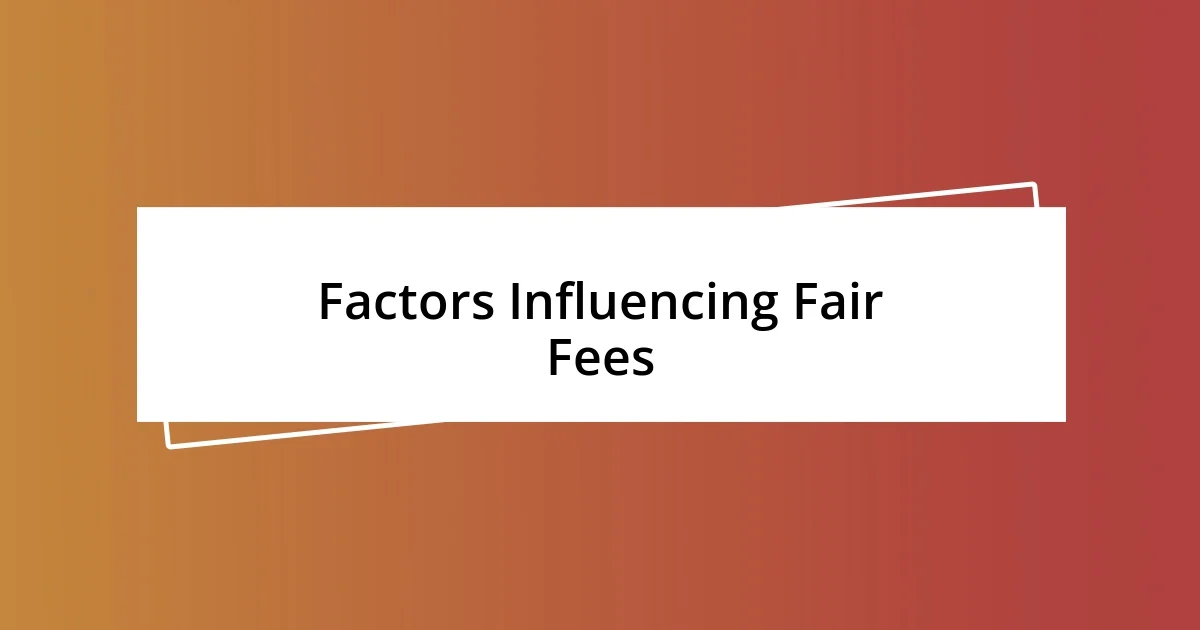
Factors Influencing Fair Fees
When considering fair fees, one of the most significant factors is transparency. I once signed up for a gym membership, and while the initial fee looked appealing, the fine print revealed hidden costs for classes and facilities. I’ve learned that being upfront about all costs creates a sense of security for consumers. Have you ever felt frustrated by unexpected charges? It can be a jarring experience that leaves you questioning the integrity of the service.
Another important element is value alignment. A few years back, I hired a graphic designer for a branding project. Their fee was higher than others, but I was captivated by their unique portfolio and attention to detail. It felt justified when the final product exceeded my expectations. I believe that when the charge mirrors the quality of service provided, it enhances the customer experience and promotes loyalty.
Lastly, market dynamics play a crucial role in shaping fair fees. I’ve noticed how businesses that offer competitive pricing tend to thrive, while those with inflated costs often struggle to retain customers. This underscores the idea that the market itself acts as a barometer for fairness. Isn’t it fascinating how much influence consumer feedback can have on pricing strategies? When customers voice their satisfaction or dissatisfaction, it can lead to changes that benefit everyone involved.
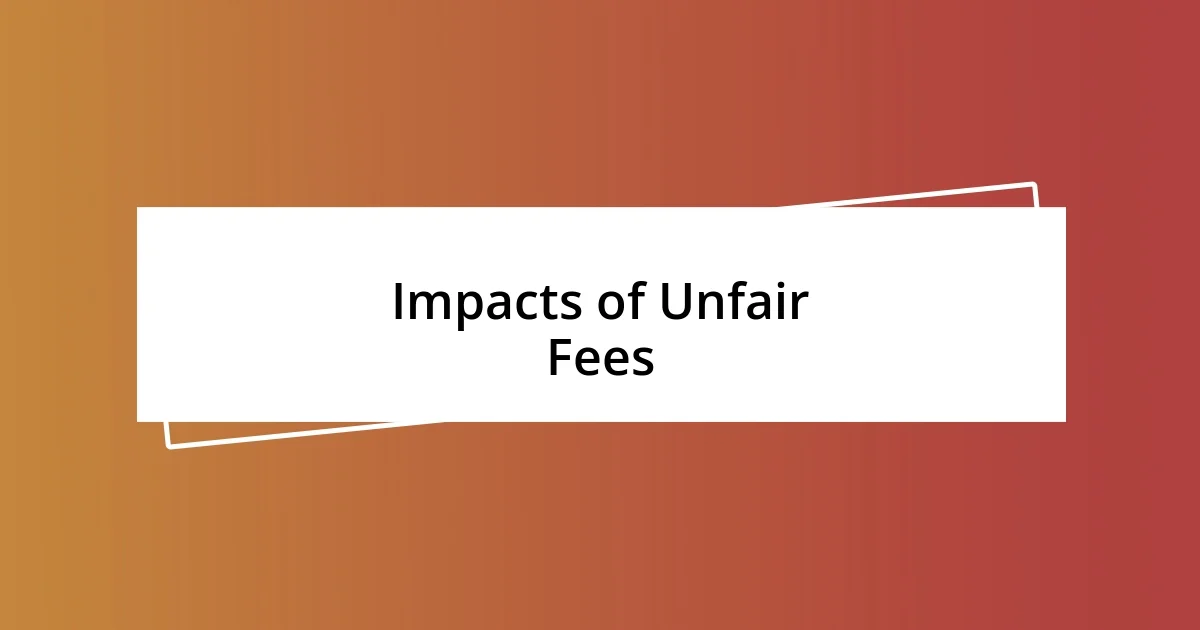
Impacts of Unfair Fees
Unfair fees can lead to a deep sense of frustration. I’ve experienced this firsthand when I enrolled in an online course with a hefty price tag. Initially, it seemed like a worthwhile investment, but the final invoice included additional fees for materials and certification that I hadn’t anticipated. It left me feeling cheated, and I started questioning the value of my learning experience. Isn’t it disheartening when what seems like a straightforward deal morphs into something far more complicated?
Another impact of unfair fees is the erosion of trust between service providers and consumers. I once frequented a local coffee shop that prided itself on its quality. When they introduced a “convenience fee” without explaining it, I began to doubt their integrity. It made me reflect on how important trust is in any consumer relationship. Have you ever noticed how a single hidden fee can turn loyal customers into skeptics? This shift in perception can be detrimental, not just for that business, but for the entire industry.
Ultimately, unfair fees can also create financial strain. I remember helping a friend who had unwittingly accumulated charges from a streaming service she rarely used. She was shocked to find that her monthly budget had been compromised due to these small, yet misleading fees. It made me realize how vital it is for individuals to be aware of and vigilant against such charges. What strategies do you employ to keep your spending in check? Recognizing and challenging unfair fees is essential in safeguarding our financial well-being.
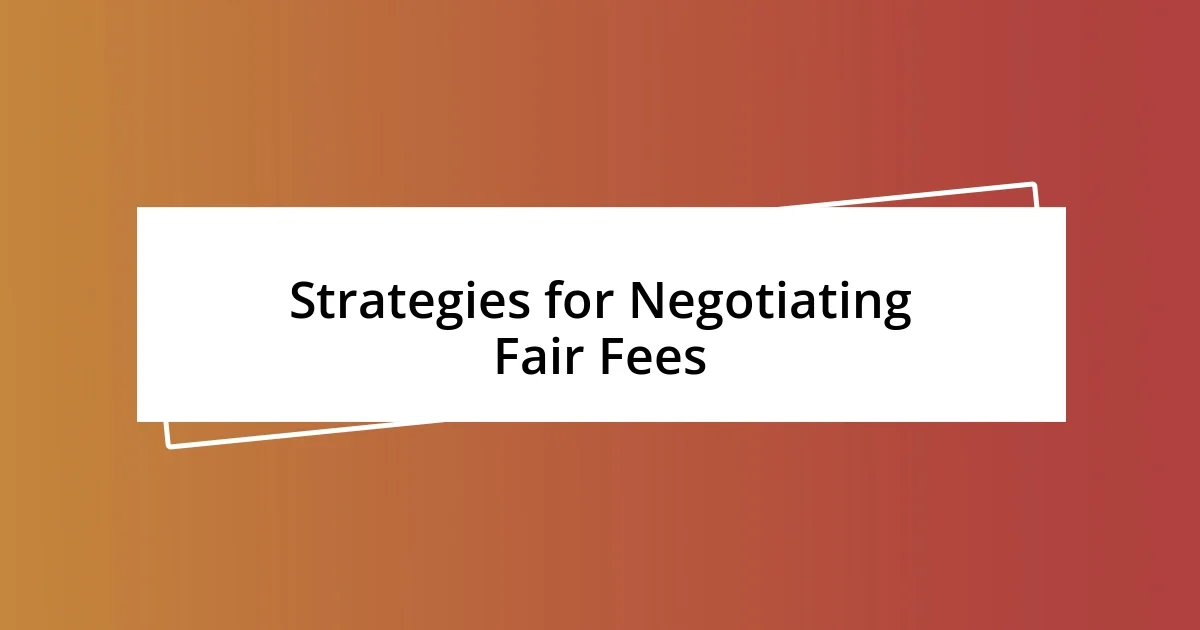
Strategies for Negotiating Fair Fees
Negotiating fair fees can often feel intimidating, but it’s all about preparation. I remember when I wanted to get my car repaired, I did a little research to understand the typical costs. Armed with this knowledge, I was able to confidently discuss the price with the mechanic, and in the end, I secured a better deal. Have you ever found that doing your homework ahead of time gives you the courage to ask for what you believe is fair?
Another effective strategy is to be transparent about your expectations. During a freelance project, I made it a point to communicate my budget constraints and the value I envisioned for the work. This open dialogue not only helped in setting clear parameters but also encouraged my freelancer to present options that aligned with my needs. Isn’t it intriguing how honesty can pave the way for collaboration and mutual respect in negotiations?
Lastly, don’t hesitate to create a sense of competition. I once had a service provider and received a lower quote from a competitor. By mentioning this, I not only prompted an adjustment among my current provider but also reinforced the idea that everyone should strive to offer competitive rates. Have you realized how sometimes just bringing a little competition into the mix can lead to a more favorable outcome for everyone involved?
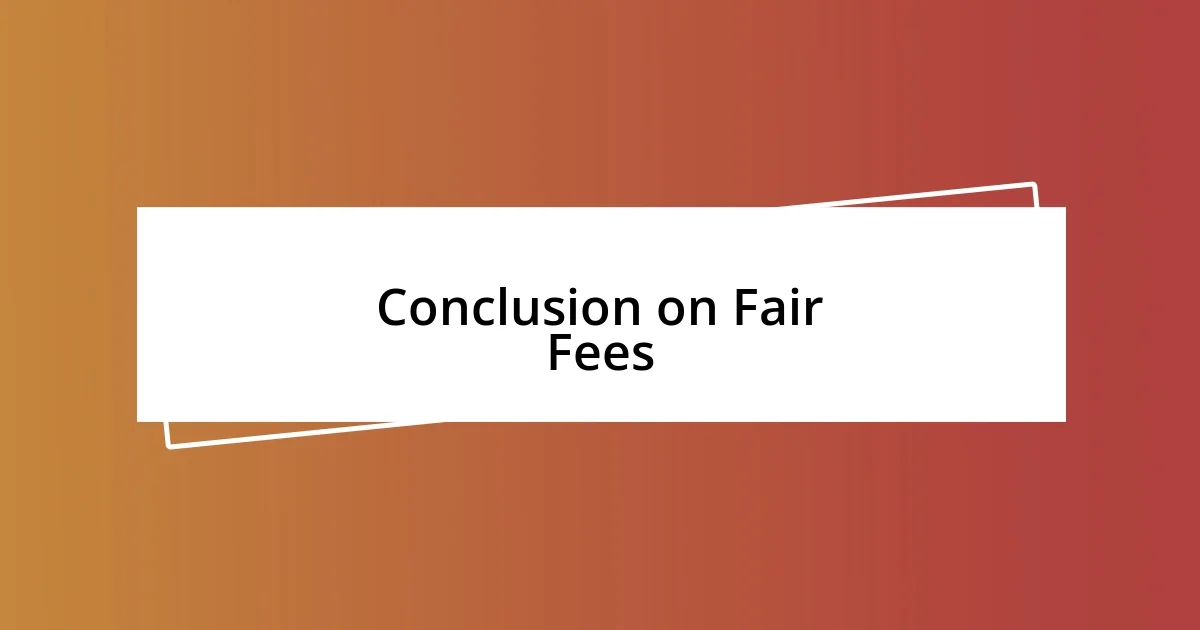
Conclusion on Fair Fees
Navigating the world of fair fees is crucial for both consumers and service providers. I’ve often wondered why transparency isn’t the norm. In a recent experience at a car rental agency, the final bill included unexpected fees for insurance that I felt should have been clearly explained upfront. It left me feeling somewhat misled. Why does it always seem that clarity comes with a price?
The concept of fairness in fees fosters a more positive relationship between buyers and sellers. I recall a time when I booked a vacation rental. The owner welcomed an open discussion about charges, which built my confidence in the transaction. The resulting rapport not only made the booking process smoother but also complicated my excitement. Isn’t it amazing how a fair exchange can enhance our overall experience?
Ultimately, advocating for fair fees isn’t just about saving money. It’s about ensuring that everyone in the marketplace operates with integrity and respect. Reflecting on instances where I felt valued as a customer, I remember how it significantly affected my loyalty to brands. What would our shopping experiences look like if we consistently encountered straightforward, fair fee structures? Embracing this ideal might just lead to a more equitable marketplace for all.














